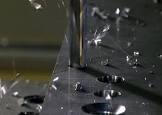🔧 Challenges in CNC Machining for Precision Drilling Management
Precision drilling demands meticulous control over every variable, from tool selection to machine calibration. Here are the most common hurdles manufacturers encounter:
1. Addressing Material Variability
Different metals and composites behave unpredictably during drilling, leading to:
– Workpiece deformation (e.g., soft metals like aluminum burring)
– Tool deflection in hardened steels or titanium
– Inconsistent hole quality due to internal stresses
Solution: Pre-machine testing and adaptive feeds/speeds tailored to material properties can mitigate these issues.
2. Tool Wear and Breakage
Drill bits degrade over time, causing:
– Poor surface finishes
– Dimensional inaccuracies
– Increased downtime for replacements
✅ Pro Tip: Monitor tool life with sensors and predictive analytics to schedule maintenance before failures occur.
3. Maintaining Tight Tolerances
High-precision industries (aerospace, medical) require holes within microns of specs. Challenges include:
– Thermal expansion altering dimensions
– Vibration-induced deviations
– Chip evacuation problems affecting hole cleanliness
Key Insight: Rigid machine setups and coolant optimization are critical for repeatability.

✅ Innovative Solutions for Precision Drilling Excellence

1. Advanced Tooling Technologies
- Carbide or diamond-coated drills for extended lifespan
- Self-centering designs to reduce walk-off errors
- High-pressure coolant systems to minimize heat and chip buildup
2. Smart Machining Practices
- Peck drilling for deep holes to improve chip clearance
- Trochoidal milling techniques to reduce lateral forces
- Real-time monitoring with IoT-enabled machines for instant adjustments
3. Data-Driven Optimization
Leverage machining data to refine processes:
| Parameter | Ideal Range | Impact |
|---|---|---|
| Spindle Speed | Material-dependent | Balances speed and tool life |
| Feed Rate | 0.05–0.15 mm/rev | Prevents chatter or deflection |
| Coolant Pressure | 70–100 psi | Ensures efficient chip removal |
📊 Best Practices for Sustainable Precision Drilling
- Pre-Process Planning
- Conduct material hardness testing.
- Simulate drills using CAM software.
- Machine Maintenance
- Regularly calibrate spindle alignment.
- Replace worn collets and holders.
- Operator Training
- Cross-train staff on troubleshooting.
- Emphasize protocol adherence for consistency.
Final Thought: Precision drilling management isn’t just about technology—it’s a blend of strategy, tooling, and expertise. By adopting these solutions, manufacturers can achieve higher yields, lower costs, and superior part quality.
Ready to refine your drilling process? Partner with experts who understand the nuances of precision CNC machining. [Contact us] today for a consultation.
